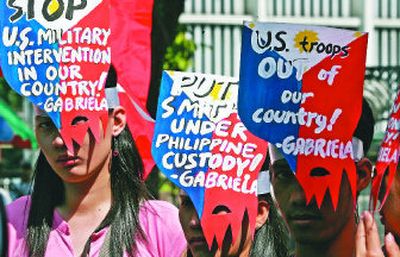Thinking globally

Instead of providing protection, the United States-led war on terror has accomplished only the opposite, according to the former head of Amnesty International USA.
It has sown more fear.
“The United States’ conduct in the war on terror has, in fact, contributed to making the world a more dangerous place,” said William F. Schulz, who worked with Amnesty International between 1994 and 2006.
Schulz, also an ordained Unitarian Universalist minister, will be in Spokane Monday to present “Terror, Torment and Tyranny: The State of Human Rights Today.” During his speech, which keynotes the President’s Speakers Series at Spokane Community College, Schulz also will share his experiences in Darfur, Sudan; Monrovia, Liberia; and other places where human rights have been threatened.
By torturing prisoners, denying habeas corpus rights to those in detention, targeting Muslim detainees and committing other injustices, the United States “has sacrificed its reputation as a leader in the struggle for human rights around the world,” Schulz said during a recent phone interview from New York.
As a result, it has become easier for Osama bin Laden and others to claim that the war on terror is nothing but a war on Islam, he said. America’s efforts to promote freedom and stand up for democratic values are then perceived as hypocritical.
“It has made it harder to convince the millions of Muslims and Arabs around the world – who inherently bore no ill-will toward the United States – that our intentions are honorable,” said Schulz, author of the book, “Tainted Legacy: 9-11 and the Ruin of Human Rights.”
America’s image around the globe has diminished not only in the Muslim world, but even among its allies, said the human rights activist, citing statistics from the Pew Global Attitudes Project.
The war in Iraq continues to tarnish America’s reputation, he said.
“It is exacerbating the war on terror because it is providing a ready pool of recruits for a new generation of terrorists,” said Schulz. “It is providing a rallying cry for al-Qaida and its allies.”
Schulz – who currently serves as a fellow at the Center for American Progress and also at the Carr Center for Human Rights Policy at Harvard’s Kennedy School of Government – also will talk about the humanitarian crisis in Darfur.
Since he participated in an Amnesty mission to Darfur in September 2004, the situation there has worsened, he said.
People haven’t paid attention to the genocide there simply because “it is in Africa,” Schulz said. “Much of Africa is not on the radar screen of the average American and often not on the radar screen of the American government.”
The United States hasn’t done much to stop the war crimes and the ethnic cleansing in Darfur because the American government doesn’t perceive itself as having a direct national interest in Sudan, he said.
Schulz suggested two ways that the United States can help stop the slaughter in Darfur: provide a no-fly zone that would prevent the Sudanese government from providing the kind of air cover that the Janjaweed militia needs to attack the villages; and put pressure on China and Russia, two of Sudan’s biggest allies.
While executive director at Amnesty International, Schulz traveled extensively internationally and domestically, visiting India, Cuba, Mongolia, as well as Louisiana’s death row. In Tunisia, he was monitored by the country’s secret police. He also received assassination threats from former Liberian President Charles Taylor.
Throughout his career, he has been outspoken in his opposition to the death penalty and his support for women’s rights, gay and lesbian rights and racial justice.
Schulz is a graduate of Oberlin College in Ohio, holds a master’s degree in philosophy from the University of Chicago and received his doctoral degree in ministry from the Meadville/Lombard Theological School at the University of Chicago.
Prior to joining Amnesty International, he worked for the Unitarian Universalist Association of Congregations for 15 years, serving as the organization’s president from 1985 to 1993. As UUAC president, he led the first U.S. congressional visit to post-revolutionary Romania just two weeks after the fall of Nicolae Ceausescu.
During that time, he also served on the Council of the International Association for Religious Freedom, the oldest international interfaith organization in the world.
While Americans have perhaps been less aware of global issues compared to their European counterparts, their consciousness has been raised in recent years by the war in Iraq and other problems, including global warming, Schulz said.
“As we increase our awareness of such things such as global warming – which is a problem that no one nation by itself can solve – we will be forced to come to the recognition that the U.S., powerful as it is, is indeed a member of a much larger international community and has to work in tandem with that community to solve all of our problems,” said Schulz.
It doesn’t help, however, to have political leaders who believe that the United States should be exempt from international rules such as the Geneva Conventions and treaties that control climate change, he added.
Despite the enormity of the world’s problems, Americans, especially the youth, still have a significant role to play, Schulz assured.
“History is in our hands,” he said, citing Amnesty International’s ability over the years to change laws and work for social justice. “We can have an impact on government policies. We can make a real difference.”